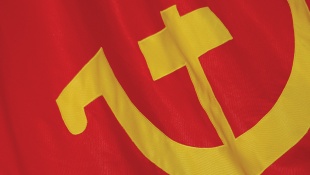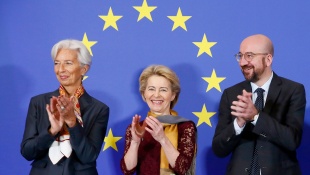First a word of appreciation on the debate promoted here today with many speeches that have and will enrich the legacy of reflection and intervention by the PCP on issues related to the euro. Special thanks to the contributions of Professor João Ferreira do Amaral and Professor Jorge Bateira who agreed to share with us their thoughts, joining other economists from our country who have been present in other initiatives that we have promoted on some central issues that we face and the necessary answers we need to give.
A second observation to emphasize that this initiative closes a cycle of three debates promoted by us. In March, on the public control of banking, in April on the renegotiation of the debt and now this, on the release of submission from the euro. Three fundamental issues that are at the centre of the necessary rupture with the right-wing policy and the patriotic and left-wing alternative policy that the PCP proposes. Three options that are related to each other: private banking, increasingly owned by foreign capital, a devourer of public funds, a source of harmful and fraudulent processes, unable to respond to the country's credit needs; an unsustainable public debt, the country's financial stranglehold, source of speculation and blackmail and factor of national impoverishment; and a single currency, contrary to national interests and which binds the Country to submission and external dependence.
The third note is to highlight the timeliness of this initiative. When we hear the European Commission, as we heard last week in its quarterly spring report on Portugal, when we recall the statements during the recent ECB President's presence in our country, when weekly EU institutions and bodies continue to make pronouncements, all and in a single voice, condemning the devolution, although insufficient and limited, of rights and incomes that were stolen from the Portuguese people, demanding a return to the forced march of exploitation and impoverishment of SGP's and the Troika that PS and PSD/CDS governments materialized, or by electing the Constitution of the Republic as an obstacle to their purposes that must be removed, we realize that more than in the past, the present and the future holds for us a struggle that will be very challenging for the recovery of our sovereignty, for the affirmation of the inalienable right of the Portuguese people to decide their future. Behold Greece, behold Cyprus, behold Spain, behold all across Europe and we realize that to the European Union, to the interests of big capital, there are no limits. Using all the tools that they control, they want and will want more, more sacrifices, more exploitation and impoverishment to satisfy the greed of their profits, regardless of poverty, regardless of unemployment, emigration, the destruction that their policies cause. This is the combat that lies ahead.
Since Portugal joined the euro in January 1999, it virtually ceased to grow. Since 2002, the year that the euro began to circulate, growth has been zero. One of the countries with the worst performance in Europe and the world!
The weak growth it was experiencing was lost with the recessions. Stagnation turned the recoveries extremely slow.
Last year, Portugal was still producing less wealth than in the year when euro banknotes were introduced. And it is still far from recovering the economic level it had before the impact of the worsening of the 2007/08 capitalist crisis.
Portugal, with the single currency, does not lose years, it loses decades!
The euro is a currency that suits the needs and interests of European high finance and major European economic groups. With an exchange rate tendentiously pegged to the productive and export capacity of Germany, its wage levels and productivity, to its industrial and commercial profile, to the requirements of its financial institutions.
It does not serve the workers and the Portuguese people, does not serve Portugal. Worse still. Affects Portuguese productions, severely affects our people and our country.
The euro deprives States of monetary, financial, foreign exchange and budget tools to promote a development that takes into account their national realities.
In Portugal, public and private investment was reduced to historic lows, the lowest level at least since the 50s. This is already the fifth consecutive year that the gross fixed capital formation does not pay its consumption, that is, wherein the investment made does not cover the wear of equipment, machinery and other instruments of economic activity. The national productive apparatus is being decapitalized, degraded, obsolete.
A country that does not invest does not grow, much less sustainably. Monetary integration is destroying the national productive capacity and seriously jeopardizes the future of the country.
The single currency also conditioned the productive activity with its excessive valorisation, made exports more expensive, domestic production was replaced by imports (instead of replacing imports with domestic production) contributed to ruin the industry and agriculture and fisheries.
The whole primary sector, plus the industry, energy and construction, which was a third of the national production on the eve of joining the euro, is now less than a quarter and lost about a third of its workers.
The single currency creates unemployment, which has more than doubled, precariousness, impoverishment, emigration, aging and desertification of the country.
It stimulates foreign debt, outflow of capital and financial speculation.
In the absence of a national central bank with all the prerogatives as last resort lender, submits the country or to the blackmail of the “markets”, i.e. of the speculators, or to the blackmail of the ECB, the European Union and the IMF, i.e. the troika.
We cannot pretend that the problem does not exist. In broad strokes, within the euro the country does not grow or grows very poorly, does not develop, does not recover employment and is at the mercy of speculators, of the ECB and rating agencies.
Joining was a disaster and remaining is an even bigger disaster. To recover monetary sovereignty is to refuse this sentence. It is not conforming to underdevelopment, nor impoverishment, or to the submission of the country.
Integration in the euro is a major obstacle to national development, which has to be removed.
It would be more appropriate, in concert with other European nations, to dissolve the Economic and Monetary Union and have compensatory measures for countries with greater difficulties in the process, but no one can become dependent on this possibility.
This is not any magic wand, but it is necessary to recover backwardness, combat exploitation, impoverishment, stagnation and dependency. It is not a sufficient condition, but it is a necessary condition.
Much will also depend on the policies that are put into practice with the abandonment of the Euro Zone. Hence we include the release from submission to the euro as a component of a patriotic and left-wing policy that we propose to the country.
Especially with the public control of banking, progressively extending ownership and public management, redirecting its activity to productive financing rather than speculative, supporting small and medium-size enterprises and families with criteria and without wasting, at the outset, the integration of the Novo Banco in the public sector, as has been proposed by the PCP.
Public control of banking is essential to ensure national control of monetary creation, from the issuance by the Bank of Portugal to the creation of currency (which is a public good) by commercial banks, rescued from increasingly foreign monopolist domination, ensuring solvency, liquidity, the viability and soundness of banking activity.
Especially also with the renegotiation of the public debt, in its terms, interest and amounts, which substantially reduces the volume of annual costs and the foreign debt, releases funds for investment and social functions of the State, stops the foreign drain of resources.
But it is not enough to combat the debt; we need to tackle the causes of indebtedness.
Within the euro, the Portuguese public and external debts have become one of the world's largest. With the stagnation of the economy. With the constraints on investment first of all public, which leads to the withering away of our productions. With excessive currency appreciation, unbearable to the domestic industry. With a stimulus for imports. With the encouragement of financial speculation and foreign debt of banks.
It is ironic to observe, in another implicit recognition of the inadequacy of the single currency to the national reality, that with the current public debt of 129% of GDP, into which the country was led with the decisive contribution of the euro, Portugal could never have joined the euro, since it exceeds twice the permissible maximum of 60% of GDP, the entry criteria.
Given the country's situation, the release of submission to the Euro, must be carefully prepared, with a view to defend the income, savings and living standards of the population as a whole.
In PCP’s view, it is fair that any costs should be borne by the speculators, financial capital, large economic groups who benefited from joining the euro.
It is not the introduction of the new currency, but the stay in the Euro, maladjusted and coercing our economy, which impoverishes the people and the country.
Since 2007, the PCP has been proposing the dissolution of the Economic and Monetary Union, which would be the ideal solution to break this constraint, negotiating compensatory and transitional measures for the peoples who have suffered the impact of the euro. But the course of capitalist integration of the EU is not going in that direction, quite the opposite.
The country has to study and prepare its release from submission to the euro, whether this option arises from a sovereign decision of the Portuguese people, or an external imposition or a process of dissolution of the Economic and Monetary Union. This preparation is essential to ensure the full use of the benefits of an exit while minimizing its costs. Costs that we do not delude or ignore.
To those who accuse the PCP of irresponsibility for putting forward this proposal, seeking to sow confusion and fear that the PCP proposes an immediate exit, without preparatory or compensatory measures, we must say that irresponsibility is not to negotiate and open this prospect in the European Union, is not to activate all the mechanisms to study how to defend national interests against an option that marks a path of rupture with the interests of big business and focuses on the aspirations of the workers, the people and the country.
The opening of this prospect in the European Union and the study and preparation that the Portuguese State must undertake to the necessary release from the Euro is urgent and necessary. To protect the income of workers and families, to ensure their savings, to ensure the normal operation of international trade, to ensure the liquidity of the financial system, safeguarding at safe levels reserves of capital and currency of the country.
If measures and options were needed to bind the country to the Euro, similarly measures and policy options are needed to ensure the release of the country from the single currency, with the central idea that this is a political process. We can quickly summarize some of the main concerns of the preparation for the recovery of monetary sovereignty, with corresponding several concrete proposals that we have, over the years, been discussing in the Party, some mentioned in the draft resolution we presented in September 2014, namely:
Unbinding of the Bank of Portugal from the Eurosystem and the full resumption of its functions as issuer, regulator and last resort lender.
The adoption of the necessary transitional technical provisions for the new currency (including the initial equivalence between the new currency and Euro).
Ensure the regular functioning of the economy and foreign trade and control of capital.
The stability and convertibility of the new currency.
The solvability and liquidity of the banks, possible only in a framework of recovery of public control of the banks.
Reassurance of the population and economic agents regarding their savings.
The conversion of debt, public and private, generated in the country to the new currency and which would necessarily be part of a process of renegotiation of the public debt that the country needs.
Translation into the new currency of the economic and financial life of the country.
Restriction of speculative activity.
Guaranty of supply of energy and other essential goods.
Defence of wages, income and consumption of the population.
The release from the euro is necessary. The release from the euro is possible.
Some say that we did not learn from Greece. But this is turning the tables. Because Greece, unlike for example the United Kingdom or Sweden, is in the euro. The Greek economic and social debacle is an example of what can happen to a country within the euro.
The big mistake of the Greek government was not wanting to leave the Euro. On the contrary, it was feeding illusions that it was possible to eliminate the policy of exploitation, impoverishment and downfall and develop the country within the euro, was not having prepared the country to free from it. A great lesson for all European peoples.
Monetary sovereignty is a structural need of the country.
To adapt the currency to reality, to the national needs and potential.
For a monetary, financial, foreign exchange and autonomous budget management, adjusted to the country’s situation.
To retrieve a central bank at the service of the country, ending the dependence and blackmail of "markets" or the troika in the last resort financing of the banks and the State.
To free from the Stability and Growth Pact, the Budgetary Treaty and substitutes, from Stability Programmes and National Reform Plans, from policies of exploitation and impoverishment, constraints on investment and productive activity.
To protect the loss of competitiveness from appreciations of the single currency.
To free from the Banking Union, which pressures privatisation and sale of national banks. As was clearly visible in the impositions made by the ECB in the process of BES and BANIF, or the blackmail that is underway on the public recapitalization of Caixa Geral de Depósitos.
To better withstand financial speculation, the outflow of capital and foreign debt.
To defend the democratic regime and the right of the Portuguese to decide their fate.
To make viable a patriotic and left-wing policy and answer the most pressing needs of the population.
The release of the country from submission to the Euro must win support from the workers and population. And the political will of a government determined to carry it out. It is, we insist, a political process.
Do not feed the illusions and learn from the past two decades.
If in this or that year, due to the exceptional combination of favourable conditions - low interest rates, low oil prices, depreciated euro, enhancement of ECB policy of injection of liquidity – we can see insufficient growth, let us be prudent not to extrapolate estimates at rhythms that reality, in all likelihood, will prove wrong.
Within the euro, the necessary improvement of income, rights and people's living standards will quickly collide against the concrete walls of its architecture and will be curbed by its increasingly constraining rules.
Economic governance, the European semesters, previous approval of budgets do not serve the Portuguese people and the stability programmes, that follow and implement them, collide with the recovery of incomes, restrain the fight against impoverishment, undermine investment, crush growth, disrupt distension of national life, hinder a patriotic and left-wing policy, give continuity to key aspects of the right-wing policy.
We opposed and contributed to the defeat of the CDS draft resolution in the discussion on the Stability Programme and the National Reform Plan, which insidiously sought to whitewash its own responsibilities and promote a policy of exploitation, and reverse the restoration of incomes and rights.
But we demarcated from those documents that the government sent to the European Commission, which are the responsibility of the PS and its government, as well as all instruments of interference, control and domination of the EU on member states.
Within the Euro, Portugal is tied to stagnation and recession, to a waste of its potential, to underdevelopment, impoverishment, dependence and national submission.
The release from submission to the euro is a necessity and a possibility. Without the release from the euro, as proposed by the PCP, without the recovery of public control of the banks, without renegotiation of the debt, it will not be possible to consolidate a policy of restoration of rights and income to which we are committed. Gone are the times when it was the PCP, and almost only the PCP, who warned of the consequences that we are experiencing today. Despite all the propaganda and mystification surrounding the supposed virtues of the euro, the collective awareness that the country is facing a problem that needs to be solved has been broadening. An idea that is gaining strength and around which converge many democrats and patriots.
On the part of the PCP, we will continue to intervene in a serious, committed and responsible way to hand back to the country and to the people what belongs to them. The country is not condemned, people do not have to live with the sword of the euro over their heads. And as so often life has shown, in the lives of people there are no dead end situations.




